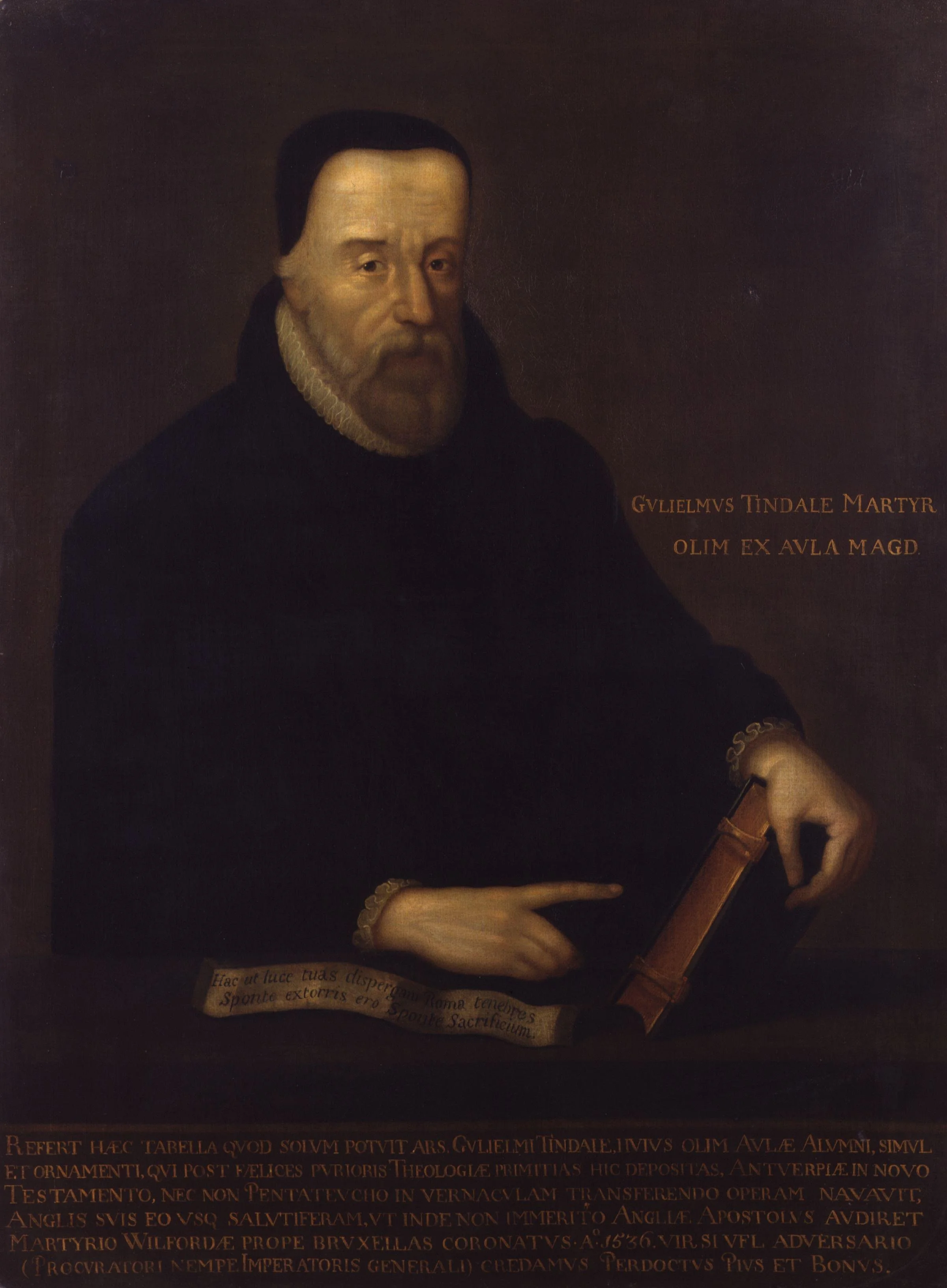An Interview with Joe Zhakevich: The Tyndale Center
Talk about William Tyndale, the namesake of the Tyndale Center. What is his contribution to church history and how is the Tyndale Center carrying on his work?
William Tyndale was a giant of faith and a genius of a translator. He was so committed to the Word of God that he devoted his life to translating it into English from the original languages—Hebrew, Aramaic, and Greek. He wanted everyone to have it and read it. He is renowned for saying “If God spare my life, ere many years I will cause a plowboy to know more of the Scripture than does the Pope in Rome.”
While hiding away from the authorities, Tyndale translated the New Testament and much of the Old Testament before he was caught and executed. He was hanged and then his body was exploded with gunpowder. Though he was killed, his translation lived on and influenced future English translations, such as the Great Bible in 1539 or the KJV of 1611. Tyndale gave his life (literally!) to translating Scripture because he believed in the authority of God’s Word. That is the foundational conviction of the Tyndale Center: to train men to translate Scripture, and to help translators translate Scripture, because it is the inspired and powerful Word of God.
When you were young, your family immigrated to the United States to escape persecution in the Soviet Union. How did that experience help you treasure the Bible and see its value not just for yourself, but for the world?
Nothing was more valuable in our household than the Bible. As a kid, I remember wanting to be able to read the Bible. The very first book I read was a children’s Bible that was smuggled into Russia from abroad. We treasured the Bible because it was the Word of God and also because the Communist regime did everything in its power to destroy all the Bibles they could.
In 1981, our house was raided by the KGB for over 10 hours, and they took every piece of Christian literature they could find—about six bags of Bibles, Christian books, and other Christian literature. We were hiding this literature in our house to distribute to the believers in Russia. But someone informed the KGB and all of it was confiscated. So, even as kids we knew that having a Bible was a gift—not something we could take for granted.
When I think about parts of the world like China or North Korea and many other places, it saddens me that the precious people of those places do not have Scripture. At the same time, this drives me to do what I can to spread God’s Word, and I pray that the Tyndale Center can be a small part of such work globally.
Tell us about your unique education path. After studying at The Master’s Seminary, you pursued more education in Israel and at Harvard. How did it prepare you for your teaching post at TMS and your work with the Tyndale Center?
Even before studying at TMS, I had already started learning Modern Hebrew, and I knew that I loved it. At TMS, I grew in my love for Biblical Hebrew, Aramaic, and Greek. During my studies, God was already preparing me for work at TMS and specifically for the LSB translation work. After TMS, I spent two years at Hebrew University in Jerusalem completing a rigorous program in Modern Hebrew, Biblical Hebrew, and Akkadian (the language of the Assyrians who exiled Israel). After that at Harvard, in God’s wise providence, I wrote my Ph.D. dissertation on how the rabbis translated the Pentateuch from Hebrew into Aramaic.
Unbeknownst to me, God used my five years of Ph.D. work to prepare me in a specific way for Bible translation, as I studied various principles and practices of Bible translation. This, of course, reached its culminating point when I was invited to be part of the LSB translation team. God’s providence is beyond what we can ask or think.
You have a Ph.D. from Harvard University with a focus on Near-Eastern Languages and Civilizations. How has the study of ancient languages reinforced your belief in the trustworthiness of the Bible?
Knowledge of the languages has enabled me to go to the source and to work with the original text and sentences penned by Moses, Isaiah, Ezra, Matthew, Mark, Paul, and all the authors of the Bible. I’m able to look at those words and know exactly what these men said and wrote. When I was at UCLA, I was witnessing to a Jewish friend, and I quoted Zechariah 12:10 to show that Jesus is God, because God says in that verse: “They will look on Me whom they have pierced.” At that point, I didn’t know any Hebrew, and so when I cited this verse, my Jewish friend immediately said to me: “That’s a mistranslation. That’s not what the Hebrew says.” I had no response. I knew that if I were to speak God’s Word with confidence, I needed to know the original languages. God has been kind to give me this gift in all these years of study, so that I can know with full confidence exactly what He says.
How is the Tyndale Center unique compared to other Bible translation organizations or initiatives? How is it advancing the gospel around the globe?
The Tyndale Center has three distinctives. First, the Tyndale Center affirms a high view of Scripture. We are committed to the fact that the Bible is the Word of God, and so we emphasize that every word of Scripture must be communicated accurately. Second, we maintain that the Bible needs to be translated from its original languages—Hebrew, Aramaic, and Greek. In this way, the Tyndale Center is actually perfectly aligned with TMS, because TMS focuses on teaching the original languages. Finally, the Tyndale Center considers the work of Bible translation to be a means to an end—the end being to preach the Word of God to people so that they are transformed.
In addition to training translators, the Tyndale Center seeks to provide tools for pastors to preach the Word. To this end, we are producing the LSB translation notes on the Tyndale Center website (tyndale.tms.edu), explaining the exegetical significance of key translational details in the LSB translation. These notes are intended to serve those who are engaged in Bible translation as well as those who are studying Scripture in order to teach or preach it. We share the perspective of Tyndale: to do what we can to make Scripture accessible and understandable to people on a global level.
TMS and the Tyndale Center don't just work to make the Word of God more available. They also prioritize principles of interpretation so that people are able to know what the Word of God means. Talk about the connection between Bible translation and Bible interpretation. Why are both important?
This builds on the question above. In translating Scripture, we affirm the literal-grammatical-historical hermeneutic. So, as we approach Bible translation, our commitment is to translate every word literally, to follow the principles of Hebrew, Aramaic, and Greek grammar in translating sentences, and to take history into account so that the translation captures the message correctly.
As an example, it’s important to translate words consistently in order to convey the theological message of a passage or a string of passages. So, in Daniel 2, Nebuchadnezzar dreams about a massive “image” (or sometimes translated “statue”). Then in chapter 3, he builds a manifestation of this “image” and demands everyone to worship it. But when Shadrach, Meshach, and Abednego refuse to worship that “image,” Daniel 3:19 states that Nebuchadnezzar became angry and the “image” of his face changed. In using the same word, Daniel made the point that Nebuchadnezzar dreamt about an image, he built that image, and that he himself was that image. Nebuchadnezzar imagined himself as the “image” that he demanded everyone to worship. Well, the problem with Nebuchadnezzar was that he was trying to take the place of God. In Genesis, God created man in His image, and God demanded that everyone worship God (Gen. 1:27). Later on, Paul writes that Christ is “the image of the invisible God” and that He is the only One we are to worship (Col. 1:15-16). But Nebuchadnezzar tried to take the place of God. We emphasize that translation must bear in mind the literal-grammatical-historical hermeneutic in producing any Bible translation.
In the end, the mission of the Tyndale Center is to equip translators, teachers, and preachers to interpret and bring the Word of God in an accurate and understandable way to the world. The prayer is that this work would transform lives and help believers be conformed to the image of Christ.


